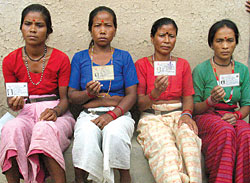 |
Committees are formed and promises are made that are not kept. The warring sides are in government, or trying to get into it, and the last thing they want is their past atrocities investigated. But the families of the disappeared want the truth about what happened to their loved ones, and they want justice as per the points laid out in the UN Convention on Enforced Disappearances (2006).
There is an added complication. The relatives of the victims remain divided, depending on which side was responsible for the death or disappearance. Various political parties hold sway over these blocs. In fact, political parties recognise victims only if they were affiliated to them as cadres.
The country may have seen the end of the war, but the families of the disappeared are not at peace. The movement towards reconciliation has become fragmented and the grief of tens of thousands of victims' families is being held hostage to vested political interests.
Therefore, we must ask, is reconciliation possible at all? As long as the plight of the victims is politicised, we will not see true peace.
No matter how many bills are drafted in parliament on Truth and Reconciliation and Disappearances, they will be buzzwords understood only by donors and their middlemen. Families, relatives and victims in rural areas are never consulted or asked for feedback.
Nepal's post-conflict period has seen the politicisation and commodification of victims. Says Sakuntala Poudel, whose husband was disappeared by the state: "Many NGO workers ask to take photographs of us and ask for photos of our loved ones, but they don't understand our needs and the value of our tears."
Krishna Khanal from Gorkha, who lost his brother during the war, says: "We can't sacrifice justice in the name of peace and reconciliation. We want to know the whereabouts of our loved ones and punish the criminals."
The recently formed peace committees across Nepal have, ironically, stirred up more conflict and made victims' families even more disillusioned. Only 60 of 75 committees have been formed, many are still without a chairperson, and their offices are often closed. In reality, the committees have failed and are mere showpieces for stakeholders and donors. The whole peace process as well as the Peace Ministry has become a donor-driven project.
Families of the victims demand to know the truth through satisfactory answers and identification of the perpetrators. In addition, families have the right to reparations, as laid out by the UN, including: restitution, compensation, rehabilitation, satisfaction, and guarantees of non-repetition.
Unfortunately, in Nepal reparation has come to be viewed solely in terms of money. The government doles out money to families and considers the matter closed, adding insult to injury. Moreover, the distribution of compensation is politicised. It is unsustainable and ineffective and contributes nothing to the greater peace process.
Laxmi Bhandari, who lost her husband in 2001, argues: "Instead of justice, the government offers money. We demand the truth." Prem Neupane, whose brother was disappeared, says, "Until we know the whereabouts of our loved ones, our struggle continues. We are ready to die for justice."
What is needed is an independent commission with the power to investigate disappeared citizens. The policy regarding enforced disappearances should be framed according to international standards, as laid out by the UN. The various agreements and commitments made by the government and political parties such as the Comprehensive Peace Agreement, Interim Constitution and Supreme Court verdicts should be implemented without compromise.
The Rayamajhi Commission's report has never been published or implemented, and ultimately contributed to the culture of impunity in Nepal. Any document prepared in the capital without wider consultation with victims' communities is not acceptable as the families of the disappeared are legitimate protagonists in the process of change, peace and the reconstruction of a new Nepal.
Unless we address these concerns, Nepal's peace process will remain fragile.
Ram Kumar Bhandari, whose father was disappeared in 2001, is a human rights activist based in Lamjung.



